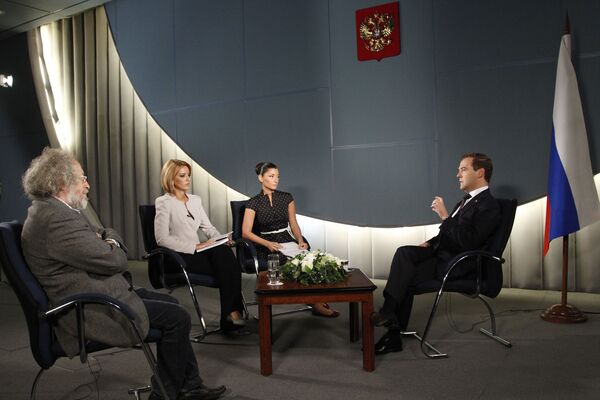President Dmitry Medvedev's interview ahead of the third anniversary of the Georgian-Russian war over South Ossetia has caused a media uproar for several reasons, not least of which is the fact that two of the journalists were ethnic Georgians - Sophie Shevardnadze from the Moscow-based Russia Today (RT) television channel and Ekaterina Kotrikadze, head of the news service at the First Caucasian Information Channel (PIK TV).
The Russian-language PIK TV, which broadcasts from Georgia to the whole of the CIS, was set up by Kotrikadze and former BBC journalist Robert Parsons. Although it claims to be an independent media outlet, many experts question its ability to criticize Georgian President Mikheil Saakashvili, who welcomed the founding of the news organization several months ago.
Kotrikadze's participation in the recent interview with Medvedev may help allay those concerns. The conversation, which was not bound by any preconditions, allowed the Russian president to freely express his views on the war and also to discuss several little-known facts. For example, Medvedev informed Prime Minister Vladimir Putin, who was in China at the time, of his decision to deploy Russian troops in South Ossetia a day after the war had begun.
"I had already issued all the orders to the military. Tskhinvali was already ablaze. Mr. Putin just made a statement condemning Tbilisi's move. That was the right thing to do, of course. We spoke 24 hours after the attack over a secure line. As you understand, it's not very appropriate to discuss matters like this by cellphone," Medvedev told the Russian and Georgian media.
Another highlight of the interview was Medvedev's admission that he issued the order to halt the advance of Russian troops in Georgia in August 2008.
"[Saakashvili] should be thankful to me for halting our troops at some point. If they had marched into Tbilisi, Georgia would most likely have a different president by now," the Russian president said.
He also made clear in the interview that Moscow would welcome a change of leadership in Georgia. However, Medvedev said it is "up to the people of Georgia to assess Saakashvili and decide his fate through a democratic vote or other means."
The president offered compelling arguments against accounts of the war that put the blame on Russia. He answered questions about Russia's alleged preparations for the conflict, the allegation that Saakashvili's action on Tskhinvali was no different from what Russia was doing to Chechnya back in 1999, and the different Ossetian casualty estimates offered by the Russian media, prosecutors and international commissions.
He said the reason for the war was the killing of hundreds of Russian nationals, including peacekeepers, on Saakashvili's orders. When the bombing of Tskhinvali began on the night of August 7 three years ago, 90% of the South Ossetian population held Russian passports. This is the reason for the conflict, Medvedev said, adding, "I will never forgive him for that ... Mr. Saakashvili is a person I'll never shake hands with."
Medvedev described himself in the interview as "a young and liberal president," which is exactly how Saakashvili positions himself. Can youth and liberal views coexist with respect for the law and democratic procedure? We will know the answer next year, when presidential elections are held in Russia and Georgia.
Ekho Moskvy Editor-in-Chief Alexei Venediktov said on air after the interview that there were no questions about Medvedev's re-election because they would have been pointless. The president would not have answered them, he said.
Saakashvili's political future is also uncertain, although most experts believe he will survive. So far, the voters in both Russia and Georgia never got the real opportunity to elect a candidate that was disliked by the political establishment (the only exception was Boris Yeltsin's election in 1991).
"After the Soviet Union collapsed, truly free presidential elections were held only once, in Abkhazia, which Saakashvili promised to return to the fold of 'democratic' Georgia," Felix Stanevsky, Russian ambassador to Georgia from 1996 to 2000, told RIA Novosti. "An opposition candidate was elected there in 2004. When Saakashvili came to power [as a result of the Rose Revolution in 2003], he won 96% of the vote, which is an unlikely achievement for a young liberal."
There is one thing the Russian president has said that even his most radical Georgian opponents will be unable to disprove: "Conflicts are no good for anyone, ever. Those who say you can resolve something through violence are liars."
The views expressed in this article are the author's and may not necessarily represent those of RIA Novosti.



